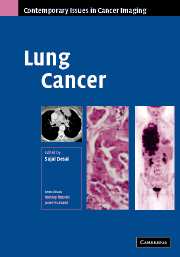Book contents
- Frontmatter
- Contents
- Contributors
- Series Foreword
- Introduction
- 1 Clinical Considerations in Lung Cancer
- 2 Pathology of Lung Cancer
- 3 Imaging of Lung Cancer
- 4 Screening for Lung Cancer
- 5 Staging of Lung Cancer
- 6 Positron Emmision Tomography in Lung Cancer
- 7 Contemporary Issues in the Systemic Treatment of Lung Cancer
- 8 Radiotherapy in Lung Cancer
- 9 Surgery for Lung Cancer
- Index
- Plate Section
- References
7 - Contemporary Issues in the Systemic Treatment of Lung Cancer
Published online by Cambridge University Press: 12 August 2009
- Frontmatter
- Contents
- Contributors
- Series Foreword
- Introduction
- 1 Clinical Considerations in Lung Cancer
- 2 Pathology of Lung Cancer
- 3 Imaging of Lung Cancer
- 4 Screening for Lung Cancer
- 5 Staging of Lung Cancer
- 6 Positron Emmision Tomography in Lung Cancer
- 7 Contemporary Issues in the Systemic Treatment of Lung Cancer
- 8 Radiotherapy in Lung Cancer
- 9 Surgery for Lung Cancer
- Index
- Plate Section
- References
Summary
Introduction
Lung cancer is conveniently divided into two major histopathological subtypes known as small cell lung cancer (SCLC) and non-small cell lung cancer, (NSCLC) by virtue of their very differing responses to chemotherapy. Since the introduction of systemic chemotherapy in the 1970s SCLC has been regarded as a highly chemosensitive tumour where chemotherapy can dramatically alter the natural course of the disease. In contrast NSCLC has been regarded as relatively resistant to cytotoxic chemotherapy. While most patients with SCLC continue to derive significant benefit from chemotherapy which always warrants its use, there has not been dramatic progress in further improving survival. This is in spite of much innovative research over the past two decades. In contrast over the same period of time, we have witnessed developments in the treatment of advanced-stage NSCLC where we have gone from a situation of uncertainty as to whether even first line chemotherapy was of any value at all, to now knowing that patients with advanced-stage disease gain survival advantage and improvements in quality of life from first, second and third line treatments. Patients with advanced NSCLC are also benefiting from treatment with novel biological therapies, though their exact role has yet to be completely defined. Furthermore, several trials have now also clearly documented the benefit to patients form adjuvant treatment following resection of early-stage NSCLC.
Non-small Cell Lung Cancer
Systemic chemotherapy has three potential roles in the management of patients with NSCLC: first, as palliative treatment of advanced disease (Stages 111B [with a pleural effusion] and IV [and MI]), second, in complementing radiotherapy for locally advanced disease (Stages IIIAN2 or IIIB [without a pleural effusion] and third, in complementing surgery for early-stage resectable disease (Stages I to IIIA [N1]) – the latter either post-operatively (termed adjuvant chemotherapy) or preoperatively (known as neo-adjuvant chemotherapy).
- Type
- Chapter
- Information
- Lung Cancer , pp. 99 - 119Publisher: Cambridge University PressPrint publication year: 2006



